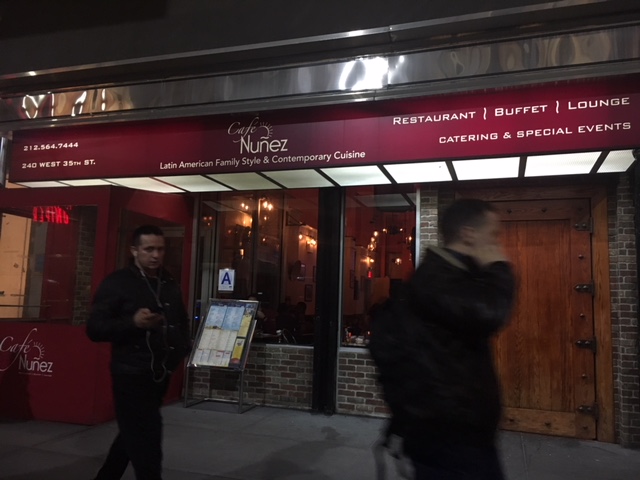
Michael DeSantis
At Café Nunez, patrons have already taken advantage of the repeal. Blue and green lights illuminated the dark back of the restaurant recently as customers danced to loud music.
Managers of bars and nightclubs in Chelsea are pleased they can let their customers get their dance on, now that the city has repealed the Cabaret Law.
Because of the law, which the City Council overturned last month after 91 years on the books, dancing was prohibited in all New York City public spaces that sold food and/or drinks unless the establishment had a cabaret license. Mayor Bill de Blasio signed the repeal into law last week, and now small Chelsea venues can let their customers hit the dance floor without fear of repercussion.
At Café Nunez, patrons have already taken advantage of the repeal. Blue and green lights illuminated the dark back of the restaurant recently as customers danced to loud music.
“You can’t really stop customers from dancing,” Yineidy Aramboles, general manager of Café Nunez on West 35th Street, says. “So it’s very hard as a business to tell customers not to dance when you have music.”
Aramboles says her club never had a cabaret license, and staffers had to tell confused customers that they had to stop dancing so no laws were violated.
“It was frustrating having to tell customers why they can’t dance,” Aramboles says. “Especially when you have good music going on.”
Just a month ago, only 97 out of about 25,000 New York City eating and drinking establishments held a cabaret license, according to The New York Times.
Clyde Woodham, the caretaker at Pioneers Bar on West 29th Street, says the establishment never had a cabaret license because of the cost. Licenses used to cost between $150 and $1,250 according to the venue’s capacity and had to be renewed every two years.
With that obstacle out of the way, Pioneers Bar will certainly allow dancing, Woodham says.
“I think it’s awesome,” Woodham says. “I think that’s probably one of the only signs of progress us lowly New Yorkers will see in this decade.”
Joe Salgo, the beverage manager at American Beauty and Slake on West 30th Street, says the club has had a cabaret license for a long time. Although the repeal may increase competition for dancing spots, Salgo is glad that the Cabaret Law is dead.
“I think the repeal is a long time coming,” Salgo says. “There’s a lot of archaic laws and this is just one of them.”
One group in Chelsea who might be displeased with the repeal are residents who could be affected by noisier venues.
In September, Manhattan Community Board 4 wrote a letter to Vincent G. Bradley, chairman of the New York State Liquor Authority, to recommend denying a liquor license to a potential new club at 544 W. 27th St., expressing concern about its opening in a neighborhood the board said is increasingly residential.
“Over the last five years the street has been making a transition to more residential uses,” the letter said. “MCB4 wants assurance with some clearly defined operational boundaries that this proposed two story restaurant (eventually with a cabaret license) will be an appropriate fit into this newly developing residential enclave.”
But managers at other Chelsea clubs say they are noise-conscious.
Aramboles says the walls of Café Nunez were built specially for noise control, while Salgo says American Beauty and Slake attends community board meetings monthly to address any complaints from citizens.
“The thing about living in the city is that we’re all in this together, whether we like it or not,” Salgo says.








